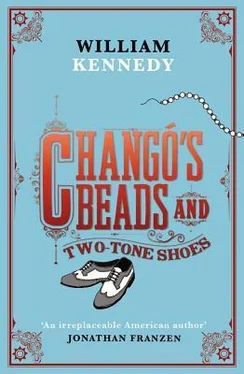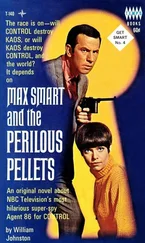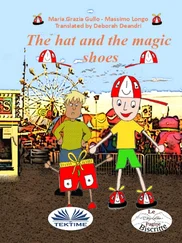“Old honky’s crazy,” the youth said.
“What are you saying, George?” Vivian asked.
“You look at me and I’m white, right? I’m a white fella goes in and out of colored people’s houses just like I was colored. When I was growing up they called me and my father paddyniggers. My father was a great man. He was all over the Civil War. I met Lincoln at the bar in the Delavan House, homeliest man I ever saw and I shook his hand before I was born. And he was Jewish. My father knew Grant and Sheridan. He was there when Sheridan took his twenty-mile ride and he wrote so much about it he made Sheridan famous. Sheridan was a little bit of a fella. Little Phil they called him. George Payne, he rode with Sheridan and he was a colored fella. Came home from the war and raised a family on Main Street up in the North End, first coloreds up there, only ones for years. My father wrote so much about George Payne that he made him famous. George Payne knew Sheridan better than the people down at West Point. My father didn’t live long enough to meet Jimmy Walker. He died in a train wreck with my mother. She was a Cuban Creole.”
“Your mother was a Creole?” Vivian said.
“That’s right.”
“Creoles in New Orleans,” Tremont said. “I know Creoles.”
“Creoles got mixed blood,” Howie said.
“Paddyniggers and Creoles,” Tremont said. “You’re makin’ this up, George. Why you tryna change your skin?”
“What Creole means is she didn’t want slavery,” George said. “She was a woman who knew the top people and she raised a ton of money for the Cuban war. My father always had to go to war. He was in the Civil War and when it ended he invaded Canada with the Fenians. Then he went to the Cuban war and came back and married my mother, who was a Cuban Creole.”
“How was she a Creole?” Vivian asked.
“She was as white as those women ever get and my father knew the guys who started that damn war. They were all Cubans. But it was John Brown, that floo-doo — he was the one who got the slaves out. Quite a fella, John Brown.” Then George sang:
“I got a white man workin’ for me,
I’m going to keep him busy you see,
Don’t care what it costs, I’ll stand all the loss,
It’s worth twice the money for to be a boss…
“I was born and raised in this town and I’ll be here forever,” he said, speaking to everybody now. “I don’t know what you got against Tremont, best little kid on Dongan Avenue, smart, and he knows how you get where you’re going and how you make money. You work for it, you set pins, you don’t throw rocks at it. You go out like I go out, and like Tremont goes out, and you find out how it is and you ask for the money. And they give it to you. What the hell, they got no choice. They need you. You are there and you’ve got the goods. This is the next stop on the railway to heaven. Bless me father for I have sinned,” and he blessed himself.
“Crazy old fucker,” the black youth said.
Through the plate glass window George saw half a dozen people standing on the sidewalk, all coloreds. It was still light out, but North Pearl Street was empty, no cars moving. Two coloreds came in and joined those at the bar.
“Somebody threw a Molotov over on Sheridan Avenue,” one said. “Hit a bus but it kept going.”
“There’s the cocktail you were looking for,” Howie said to Vivian.
“Who threw it?” Vivian asked the youth, who looked at her but did not reply. The youth who didn’t trust George shook his head and they both turned away from Vivian.
“Sheridan Avenue,” George said. “They named that for General Sheridan. He was born there. Petey Hawkins had his barbershop on Sheridan Avenue.”
“Petey Hawkins. I knew Petey Hawkins,” Tremont said. “Lived up on Third Street. I knew the whole family. Petey’s sister Seely was a good singer. She came to Albany in a musical and they hired my daddy for a part. He was seven feet two and he’d been singin’ in sideshows as the Albany Giant, and when that musical come here they saw him and hired him and he was so funny they took him on the road with the show.”
“Petey’s brother Dick was a great friend of mine,” George said.
“Don’t talk about him, George,” Vivian said. “Please don’t say Petey’s brother’s name. Talk about Petey but not his brother. Do you hear me, George?”
“Don’t say his brother’s name?”
“Don’t say it. Don’t say it for me, all right, Georgie?”
“All right, I won’t say it for you.”
Matt Daugherty opened the front door and held it ajar, looked in. He saw Tremont and shook his head. He came in and let the door close.
“You ran out on me, Tremont,” he said.
“Had to, Bish. Knew you’d find me, had to get outa there. You know why.”
“No, I don’t.”
“I saw that guy we talked about, comin’ right toward the hospital. I couldn’t stay there like a damn sittin’ duck.”
“You’re sitting here like a sitting duck. And you’re drinking. They just treated you for the ’ritis and you’re starting all over.”
“They fixed me up, ’ritis ain’t so bad now. I needed to settle down.”
“They’ll write you up, Tremont. You and your ’ritises’ll go into the medical books. How are you, George?”
“Five or six flavors of excellent, and yourself?”
“I talked to Danny. He’s worried about you.”
“Danny worries too much. Worrying gives you hives. I got hives when Dewey closed down gambling in Albany. You get very itchy.”
“Danny said you were going to a concert.”
“We are if we ever get there,” Vivian said. But she liked the newness of the Four Spot and she wouldn’t really press George to leave.
“Danny wants to meet you at the concert,” Matt said.
“Danny shouldn’t worry so much,” George said. “He’ll break out in hives.”
“I’ll tell him,” Matt said.
From his bar stool Tremont saw Zuki on the sidewalk, talking with Roy. No way you gonna lose him now, Tremont. No place to hide. But why hide? What can he do? Beat me up, I don’t think so. Got the Bish and Roy with me. Maybe blow the whistle on me? But then he’s in it as much as me. He wants to do something, I know that. All that badass talk comes outa someplace, like political. He a Panther comin’ on like Joe College? Narc? And why he come to you, Tremont? Who’d you ever lick? Hey, Tremont’s a good shot, he be the triggerman, he be the killer. Knock off the Mayor, then somebody knock off Tremont, everybody’s happy.
James Brown was new in the smoky air of the bar, telling everybody, I Got the Feelin , and the mood of the room went into an upswing — heads going whichway, bodies revving, George nodding in time to James’s feelin.
“Bish,” Tremont said, “I got the feelin’ myself, and you right about me bein’ a sittin’ duck in here. There’s Zuki out there talkin’ to Roy.”
Matt looked out, saw Roy with the young blacks.
“Which one is Zuki?”
“Slick dude in the T-shirt and shades,” Tremont said.
The two were standing with eight or nine youths in front of the bar. Roy was talking and the cluster was listening. Roy shakes his head, doesn’t approve. Of what?
“What can Zuki do to me, Bish, throw me in the river?”
“He could do that,” Matt said. “But not if you went public with your story, talk to Quinn’s friend Doc, the cop, and you’d have a head start on him.”
“You sayin’ I should tell people Zuki wanted me to shoot a politician?”
Matt smiled at Tremont’s volume, then saw that Howie the bartender, George, Vivian, and some blacks had all turned to look at Tremont.
“They just shot one of the Kennedys,” George said. “I don’t know which one. I was in Atlantic City when Czolgosz shot McKinley. They fried him at Sing Sing seven weeks later.”
Читать дальше












